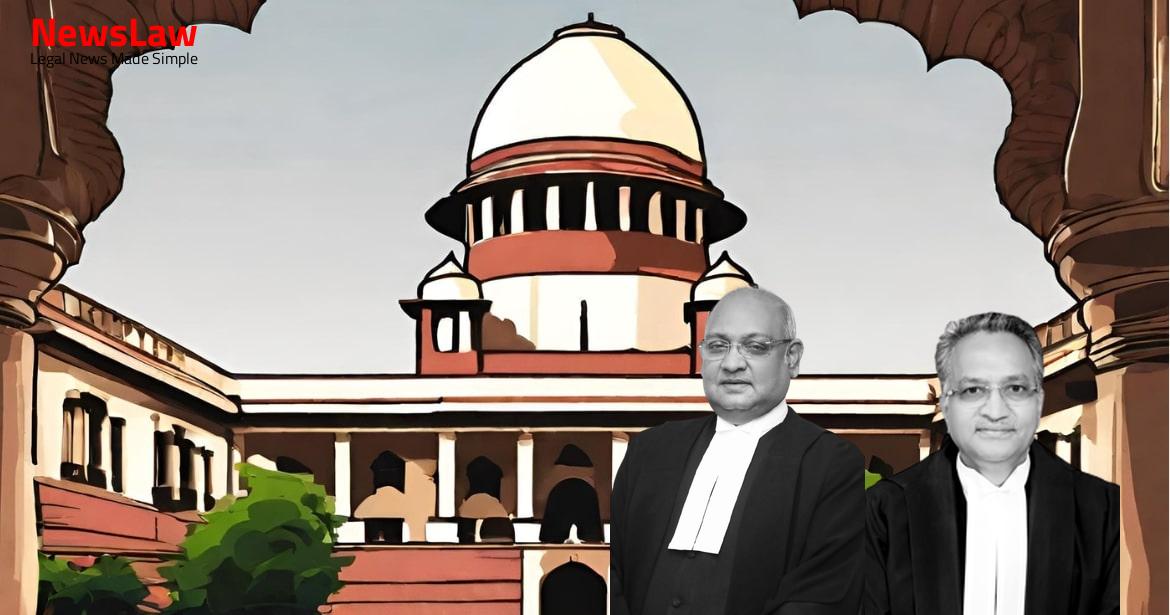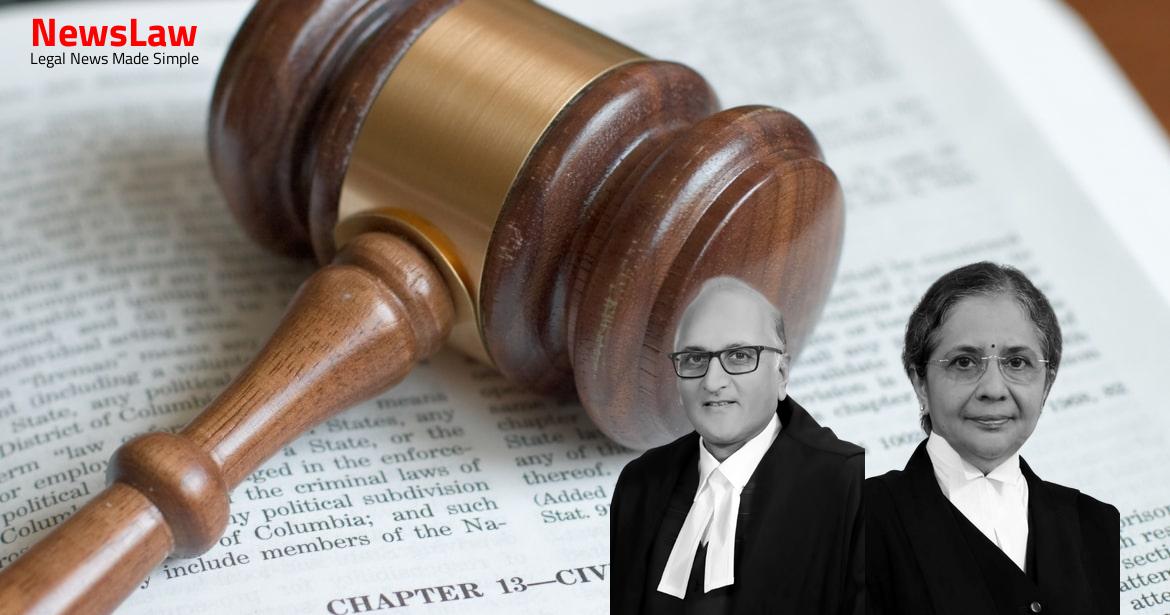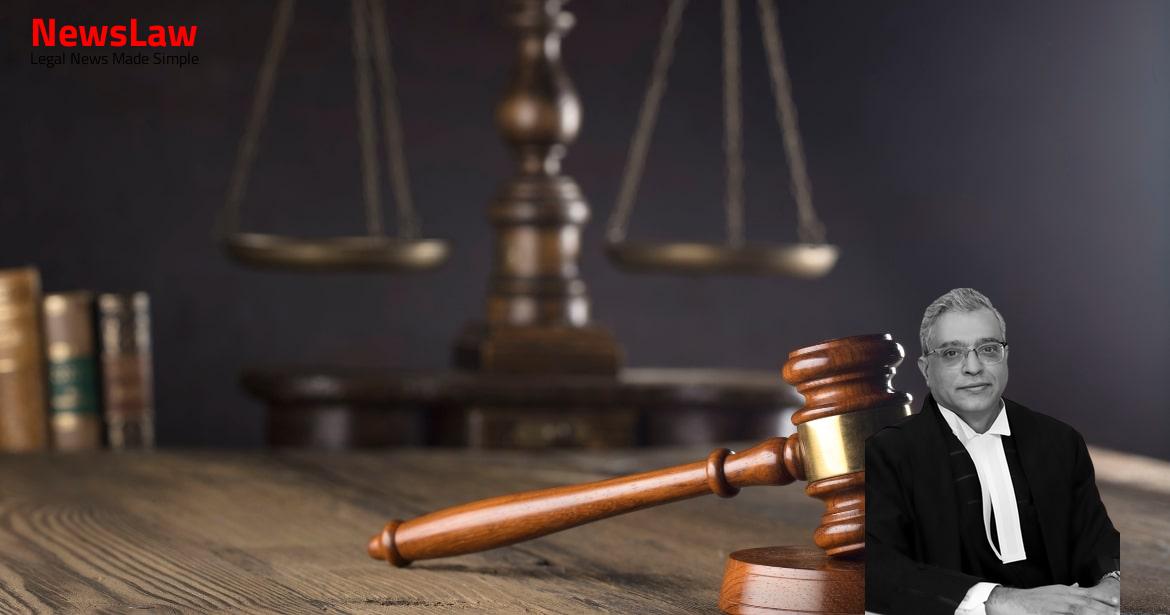Discover the details of the recent Supreme Court judgment in the case of C.P. No. 16/2017, where the Court grappled with the complex issue of balancing the rights of the accused and the victim. The case involved serious offences, and the Court had to determine whether the contents of a memory card qualified as electronic records and could be considered a ‘document’ under the relevant laws. Stay tuned to learn how the Court addressed privacy concerns while upholding the principles of a fair trial.
Facts
- The investigating officer attached to the Nedumbassery Police Station, Ernakulam, Kerala filed police reports under Section 173 of the 1973 Code before the Judicial First Class Magistrate, Angamaly.
- The petitioner entered appearance upon receiving the summons and was served with copies of prosecution records.
- Statements of concerned witnesses were recorded and relevant evidence was collected during the investigation.
- Single Judge of the High Court dismissed the petition and confirmed the Magistrate’s order.
- Seized memory card was considered as the medium on which the alleged incident was recorded.
- The High Court concluded that the memory card itself is the product of the crime.
Also Read: Judgment by Supreme Court of India in M/s. Bhilwara Processors Ltd. vs. Department of Central Excise
Issue
- The issue in this appeal revolves around whether the contents of a memory card/pen-drive can be considered electronic records and qualify as a “document” under relevant laws.
- Another key question is whether the contents of the memory card/pen-drive submitted to the Court can be treated as a document.
- The issue of whether it is mandatory to provide a cloned copy of the memory card/pen-drive contents to the accused as per Section 207 of the 1973 Code is also discussed.
- Furthermore, the question of whether the Court can deny the accused’s request for a cloned copy of the contents due to privacy concerns for the victim and potential misuse by the accused is raised.
- The appellant is accused No. 8 in a case involving various serious offences, and these questions have arisen in the context of the alleged incident reported by the victim.
Also Read: Agarwal v. Family Court: Resolving Document Production Dispute
Arguments
- The appeal should be dismissed as the appellant disclosed the identity of the victim in the memo of the special leave petition.
- The appellant falsely asserted that he had personally perused the contents of the pen-drive, which is not true.
- The appellant’s claim that the contents of the memory card must have been tampered with is contradicted by forensic reports.
- The memory card and pen-drive containing visuals of sexual violence are considered material objects.
- The appellant is facing prosecution for rape, with the trial being an in-camera trial.
- Accused/appellant can seek limited relief to view the pen-drive contents in Court or take a second expert opinion, maintaining victim privacy.
- The appellant opposing the appeal is seen as the mastermind of the conspiracy.
- The visual contents on the pen-drive are physical evidence, not merely a document.
- There is concern that providing a cloned copy of the memory card contents to the accused may lead to misuse.
- The prosecution case relies on forensic reports of video recordings retrieved from the memory card on specific dates and times.
- In a hypothetical scenario, appropriate conditions could have been imposed when furnishing a cloned copy of the memory card contents to the accused/appellant.
- The petitioner and intervenor argue that the appeal should be dismissed as it lacks merit.
- Both sides have cited various court decisions and relevant laws to support their stance.
- The petitioner sought permission to view the video during trial, but the investigation official filed a petition objecting to this.
- The prosecution strongly opposed the petitioner’s request, fearing it would further harm the victim who has already suffered at the hands of the accused and media.
- Ultimately, the court permitted the petitioner to view the video footage as a preventive measure against potential misuse while ensuring a fair trial for the accused.
- The petitioner’s counsel requested copies of the audio and video footage and its transcript for further examination.
Also Read: Supreme Court’s Landmark Judgment on Compensation for Loss of Dependency
Analysis
- The accused have the right to claim copies of documents and contents of the memory card/pen-drive as per Sections 207, 243, and 173 of the Code of Criminal Procedure.
- The memory card is considered a material object and not a document.
- The trial commences as soon as the court frames charges, allowing exercise of power under Section 319(1) of CrPC at any time before judgment.
- The accused have the right to fair trial under Article 21 of the Constitution of India.
- The investigating officer must forward all documents and relevant extracts to the Magistrate as per Section 207 of the 1973 Code.
- The accused may request expert opinion through expert agencies like CFSL to confront prosecution witnesses.
- The High Court can issue suitable directions under Section 482 of the 1973 Code to meet the ends of justice.
- The contents of the memory card would be considered a ‘matter’ and the memory card itself a ‘substance’, making it a ‘document’.
- The right of the accused to a fair trial must be balanced with the interest of the victim and society.
- The accused may request inspection of the memory card content in court for defense preparation.
- The cloned copy of the memory card contents must be furnished to the accused to present the defense effectively.
- The constitutional mandate and statutory rights given to the accused imply an obligation on the prosecution to make fair disclosure of documents relied upon.
- Fair disclosure includes furnishing any document the prosecution relies upon, whether filed in court or not.
- The term ‘document’ should be interpreted broadly to include any material with writing or printing capable of being evidence.
- In cases of balancing between fundamental rights, the test applied may differ from intra-fundamental rights conflicts.
- The Magistrate is required to ensure compliance with Sections 207 and 208 of the Criminal Procedure Code (CrPC) for a fair trial.
- The concept of ‘due process of law’ includes fairness in trial, emphasizing the importance of balanced rights for both parties.
- Applying the principle of larger public interest is necessary when weighing conflicting fundamental rights.
- The judiciary must issue suitable directions to maintain the balance between protecting individual rights and collective interest.
- The definition of ‘document’ should encompass various forms of inscribed information, not limited to paper writings.
- The judiciary is bound to safeguard the accused’s rights to fair trial, including access to statements and documents used by the prosecution.
- The investigating officer must forward all documents on which the prosecution relies to the Magistrate along with the police report.
- There is no provision allowing the investigating officer to exclude any part of a document from copies given to the accused.
- Limited discretion is given to the investigating officer to provide copies of some documents to the accused if found convenient.
- Video footage or clippings stored in memory cards or pen drives are considered electronic records and are deemed documents.
- An electronic record includes data, records, or images stored in electronic form.
- The definitions of ‘document’ and ‘data’ under the relevant acts and codes reaffirm the inclusion of electronic records in the category of documents.
- The accused must receive copies of the police report, FIR, statements, and other relevant documents without delay and free of cost.
- The Magistrate has the discretion to exclude certain parts of statements or documents from being furnished to the accused if deemed necessary.
- The legal definitions and provisions highlight that electronic records are admissible as evidence subject to the prescribed conditions.
- An appeal partly succeeds where the accused seeks access to electronic records for a fair trial.
- The Magistrate must consider such applications with judicious discretion to prevent trial protraction.
- Accused and their authorized representatives must not carry devices capable of copying or mutating electronic records.
- The content of memory cards/pen drives is regarded as a document and must be provided to the accused for an effective defense, unless privacy concerns exist.
- In cases of privacy issues, the Court may allow only inspection of electronic records for the accused to present an effective defense.
Decision
- Trial in C.P. No. 16/2017 to be concluded expeditiously, preferably within six months from the date of this judgment.
- Court may issue suitable directions to balance the interests of both sides.
- Impugned judgment and order modified to give the appellant/accused an option as indicated in paragraphs 37, 38, and 43 of the judgment.
- Application filed by the appellant in C.P. No 16/2017 (Crl.M.P. No 49/2018) partly allowed based on the modifications.
Case Title: P. GOPALKRISHNAN @ DILEEP Vs. THE STATE OF KERALA
Case Number: Crl.A. No.-001794-001794 / 2019



